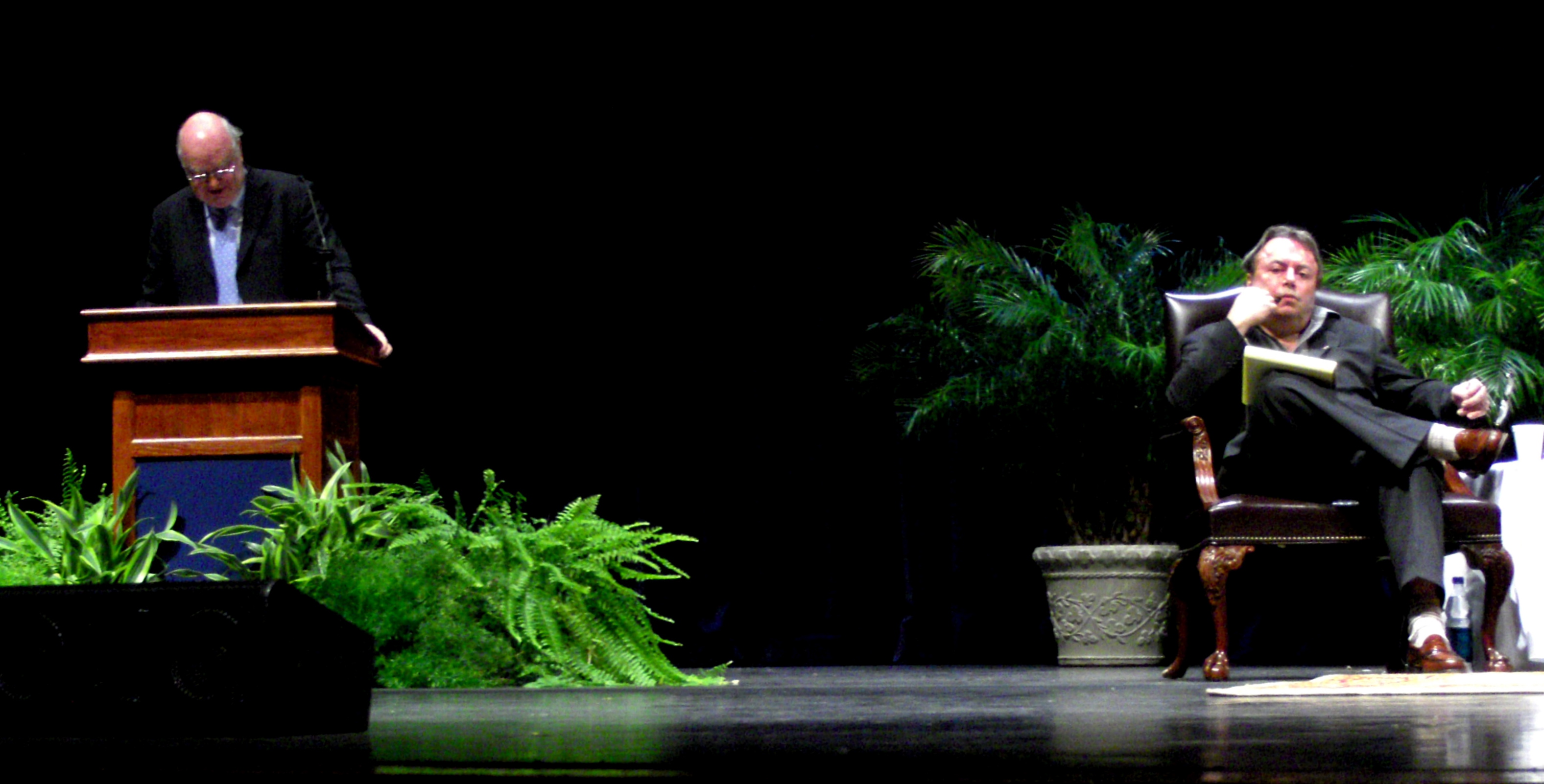
Christopher Hitchens debated John Lennox at the Edinburgh International Festival, on whether atheism will provide a viable future for Europeans. The file is available for purchase online, but I don't recommend that anyone buy anything from the Fixed Point Foundation. There are far too many free files available of comparable or superior quality to their events.
Christopher Hitchens leads by arguing that terrible things have happened in Europe as a result of religion, and then he makes the giant leap that only secularism can save the day. He might well be right, but he did not deductively or inductively connect his conclusion to his premises. It may well be true that Abrahamic religion poisons everything European, but this does not logically imply that either secularism or atheism will have a good shot at salvaging Europe from a rising tide of fundamentalism both Christian and Muslim.
John Lennox makes the case that the so-called "New Atheists" have confused the essential message of Christianity with the abuses perpetrated by the political powers of Christendom, which is at least partly true, and is undoubtedly true in the case of Hitchens himself. It is surely irrational to tar one’s opponents with too broad a brush, however, in the next breath Lennox writes off all secular moral reasoning as mere post-modern chatter, thus committing precisely the same breach of reasoning and etiquette, confounding his opponent’s actual positions with those of his least admirable comrades. It gets worse, however; as he goes on to confound humanism with communism. At this point, it becomes clear that this man may safely be dismissed as a wellspring of serious criticism. He eventually gets around to making an argument that we have to assume that the universe was created in order to discover that it is intelligible. He goes on to talk about ethics for just a bit, claiming that our innate revulsion at certain actions must come from the God of Abraham rather than mere natural selection, an argument which might work on audiences ignorant of both cultural anthropology and the fallacy of the false dilemma. He closes by saying that if we cannot have eternal Heavenly justice, there is no point at all in seeking temporal Earthly justice. In summary, Lennox sounds almost as rhetorically smooth as Hitchens, but his arguments are somehow even less coherent.
The rebuttals are muddled and scattershot, but what else might one expect, given the lack of argument heretofore?
Overall, this debate elevates style over substance and rhetoric over logic. This is (alas) not terribly unusual in such debates, but this event really takes it to a whole new level. Both speakers manage to sound quite intelligent without ever making even one inductively or deductively valid argument. Good lord below, I’ve done my mind a disservice by slogging through this one.
Christopher Hitchens leads by arguing that terrible things have happened in Europe as a result of religion, and then he makes the giant leap that only secularism can save the day. He might well be right, but he did not deductively or inductively connect his conclusion to his premises. It may well be true that Abrahamic religion poisons everything European, but this does not logically imply that either secularism or atheism will have a good shot at salvaging Europe from a rising tide of fundamentalism both Christian and Muslim.
John Lennox makes the case that the so-called "New Atheists" have confused the essential message of Christianity with the abuses perpetrated by the political powers of Christendom, which is at least partly true, and is undoubtedly true in the case of Hitchens himself. It is surely irrational to tar one’s opponents with too broad a brush, however, in the next breath Lennox writes off all secular moral reasoning as mere post-modern chatter, thus committing precisely the same breach of reasoning and etiquette, confounding his opponent’s actual positions with those of his least admirable comrades. It gets worse, however; as he goes on to confound humanism with communism. At this point, it becomes clear that this man may safely be dismissed as a wellspring of serious criticism. He eventually gets around to making an argument that we have to assume that the universe was created in order to discover that it is intelligible. He goes on to talk about ethics for just a bit, claiming that our innate revulsion at certain actions must come from the God of Abraham rather than mere natural selection, an argument which might work on audiences ignorant of both cultural anthropology and the fallacy of the false dilemma. He closes by saying that if we cannot have eternal Heavenly justice, there is no point at all in seeking temporal Earthly justice. In summary, Lennox sounds almost as rhetorically smooth as Hitchens, but his arguments are somehow even less coherent.
The rebuttals are muddled and scattershot, but what else might one expect, given the lack of argument heretofore?
Overall, this debate elevates style over substance and rhetoric over logic. This is (alas) not terribly unusual in such debates, but this event really takes it to a whole new level. Both speakers manage to sound quite intelligent without ever making even one inductively or deductively valid argument. Good lord below, I’ve done my mind a disservice by slogging through this one.
1 comment:
Dude, did you find, or do you know where to find the recent Richard Carrier v J.P Holding debate? I'm dying to hear it...
Post a Comment